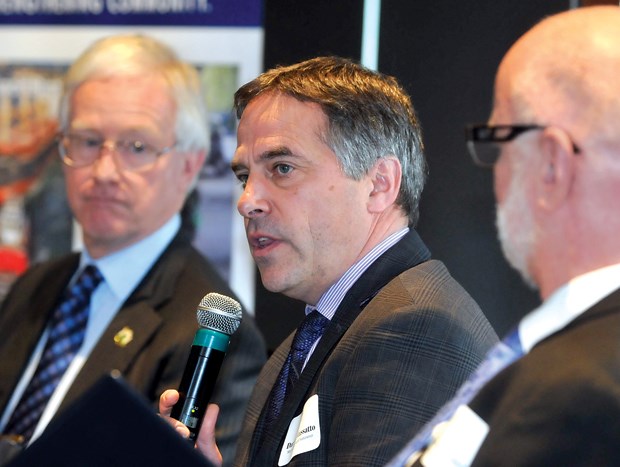The North Vancouver Chamber of Commerce hosted its annual chinwag between North Vancouver’s mayors and the business community Jan. 30 and, to the surprise of no one, the issue of transportation led the discussion.
City of North Vancouver Mayor Darrell Mussatto and District of North Vancouver Mayor Richard Walton are both major proponents of the Yes vote in next month’s plebiscite for a 0.5 per cent “congestion tax” to fund the transportation improvements outlined in the TransLink Mayors Council Vision.
But the mayors were asked to defend their position in light of West Vancouver Mayor Michael Smith joining the No campaign.
Smith wrote an op-ed for the Canadian Taxpayers Federation last week saying he could not support any new taxes being levied as long as TransLink is governed by an unelected board with no local accountability and no guarantee the money will be well spent.
On the matter of governance, Mussatto and Walton agreed with Smith, but the two didn’t land at the same conclusion that the plebiscite should be voted down.
“Governance is absolutely critical. I think all the mayors in the region agree with Mike on that,” Walton said.
Mussatto countered that transit needs improvements and expansion of services, whether the governance structure is to the mayors’ liking or not.
“I know of no Plan B if this fails,” Mussatto said.
A successful No vote would mean our transit system would be stalled at the status quo, which won’t suffice as the region continues to grow, leading to more people in cars and worse traffic congestion, Walton added.
“If you don’t keep expanding the system to meet the need, you actually will find a decline (in ridership) and that likely will be what happens under the current legislation if this referendum does not pass,” Walton said.
Talk of transportation woes led to a conversation about development on the North Shore. Both mayors take heat for the level of residential growth but the North Shore is growing at a slower rate than cities in Metro Vancouver, Walton said.
“It’s not nearly as crazy as people think it is. We’re well behind our (official community plan) targets from four years ago. We had only 390 units built in the last three or four years,” Walton said.
Walton added that much of the traffic frustrations experienced by today’s residents, like the Cut backing up to Lonsdale Avenue almost nightly, are due to people who cannot afford to live here commuting from areas where housing is more affordable.
And while condo projects may not be universally popular on the North Shore, they are the intelligent way to deal with a growing population, Mussatto added.
“We have a million people coming in the next 25 years. We have to manage that. We don’t cut down trees anymore for single-family subdivisions. Those days are gone and we all agree that’s not a good thing to do,” Mussatto said, noting that 85 per cent of city residents live in multi-family homes. “We have to live a little closer together.”



